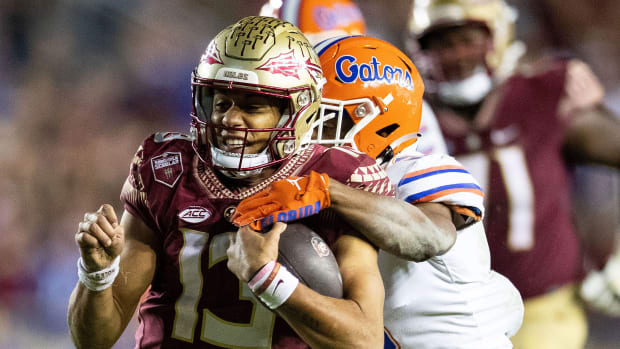The state of Florida’s name, image and likeness (NIL) amendment has cleared its last legislative hurdle and will now be sent to the desk of governor Ron DeSantis, whose signature is expected as early as Friday or sometime next week, according to sources. The amended law will go into effect once DeSantis signs it.
The main change, spearheaded by state representative Chip LaMarca and state senator Travis Hutson, is the removal of so-called cause compensation language that will allow for schools to more directly facilitate deals. Previously, schools were not allowed to be seen causing cash to be directed to athletes. The original thought behind it was to protect coaches’ time, but functionally it created red tape and confusion as schools tried to navigate what was permissible.
A source at one school gives Sports Illustrated an example of an athlete sending an email to a representative of a collective regarding a deal and cc’ing their coach on it because they didn’t know any better. It created some ambiguity about what exactly was and wasn’t permissible and if the deal could be done at all.
“This allows us to become a little more officially official with the university,” says Corey Staniscia, head of USF’s Fowler Ave collective and a former aide for LaMarca’s. “There’s a lot more flexibility when it comes to coordinating and having conversations with staff and administration in a way that we were restricted before.”

Alicia Devine/Tallahassee Democrat/USA TODAY Network
When Florida passed its law initially, it made it ready to go when the switch was flipped on NIL on July 1, 2021, and schools in the state were happy to have guard rails in the absence of direction from the NCAA. As time passed, Florida, along with other states that had legislation when the NIL era began, felt they were at an advantage. Feedback from coaches and administrators at Florida’s universities made it clear that in some ways they were not. Schools in states without laws only had to follow what ended up being scant guidelines from the NCAA.
Florida’s initial NIL legislation was drafted at the end of 2019 and wormed its way through the legislative process in early ’20. Florida is one of multiple early adopters that felt some buyer’s remorse. Alabama fully repealed its law, while Nevada is working to amend its own currently. Mississippi, Tennessee, Illinois and Louisiana have previously amended their law. Lawmakers were unable to get significant movement on Florida’s NIL bill in the ’22 legislative session with leadership focused on other issues, but under new Speaker of the Florida House Paul Renner, there was an appetite to take on the NIL issue once more. The alignment allowed the law to fly through the process before the state’s legislative session even begins.
“It’s a priority of this current leadership in the House and Senate and it’s definitely a priority of our governor,” LaMarca says. “I think when we’re all on the same page on something it’s clear that we can get things done. It’s important the date and the timing means that Florida will remain competitive. That’s why we wanted to get it off the agenda now and move on to other business after this.”
But messages are mixed about how much of an impediment the law really was in the first place. Even Staniscia admitted he wasn’t 100% sure an update was needed, and Florida football coach Billy Napier told reporters he didn’t see the law as much of a problem on February signing day. But on Feb. 8, Florida State AD Michael Alford told his Board of Trustees that “we can’t compete with what our competitors in other states can do at this point,” referencing his wish that schools could advise athletes throughout the entire process of coming to a deal.
Beyond the removal of the cause compensation language, the amended law also has provisions for adding entrepreneurship education to language about what financial literacy services schools can provide their athletes, and they can coordinate those programs with collectives. Such language is a big reason why the initial law wasn’t repealed outright.
“Obviously cause compensation is the big issue that we’re all talking about, but for me it’s not my top issue,” LaMarca says. “My top issue is making sure that these kids playing all types of sports, both men and women, have the opportunity to have solid financial literacy and life skills training and nation-leading entrepreneurship training. That’s one of the biggest pieces, that we make sure these kids have access to really good training so they do good things when they have the opportunity to make some money.”
The bill could be preempted by federal legislation regarding NIL or more robust NCAA guidelines. It is no secret the NCAA is seeking congressional assistance on governance, and it will be up to incoming president Charlie Baker—the former governor of Massachusetts—to pursue that when he begins the job March 1. Despite LaMarca’s work on this issue at the state level, he says the true answer is a federal policy or the NCAA developing a real plan and not just relying on interim guidelines. He also expressed confidence in Baker’s leadership moving forward.







